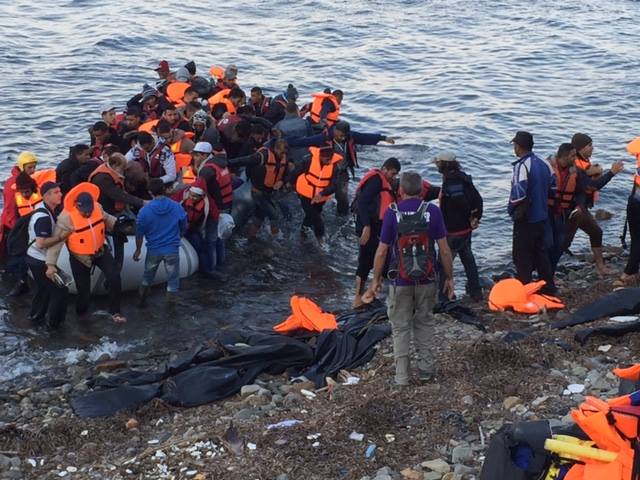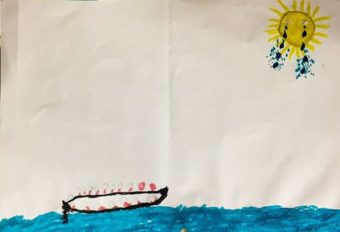
Every month, thousands of refugees from countries including Syria, Afghanistan and Iraq make dangerous trips in overcrowded rafts, seeking a better life in Europe. The Greek island of Lesbos has been inundated with refugees for months now.
As European leaders struggle with how to handle the influx, volunteers from around the world are on the ground in Greece to do what they can to help. Haines EMT Eric Kocher just returned from about four months in Lesbos providing medical support.
Kocher says he didn’t know much about the refugee crisis until a nonprofit called Remote Area Medical asked him to travel to Greece in November and help investigate the need for medical care. He arrived back in Haines this month and described what he and his team would see every day on the shores of Lesbos.
“Raft after raft would be coming. When refugees came off the raft they would be wet, cold, some would have medical issues. These are really poorly constructed rafts. Apparently you could smell the fresh glue on some of them. They could comfortably hold 20 people, but they would come with between 50 and 70 people.”
The rafts were making illegal trips from Turkey. Refugees pay smugglers to take them on the fairly short, but dangerous trek between the two countries. Kocher says the refugees were visibly relieved when the flimsy rafts pulled up to shore in Lesbos.
“It was powerful to see people get off those rafts and get down in a prayer of thanks. You could see the stress and tension they were under leaving them.”
But the refugees’ challenges didn’t end in Greece. Many surrounding countries have closed their borders or put strict limitations on who is let through. Kocher says there have been accounts of Macedonian border guards beating people who try to cross over on their way to Germany or other countries.
Germany was the goal for an Iranian refugee couple Kocher stayed in touch with after meeting them in Lesbos. They told him they were fleeing political oppression and imprisonment in Iran.
“I continued to hear from them and they had some really difficult times, they snuck across the [Greece-Macedonian] border a couple of times, they were beaten. They were stuck, 17, 18 people in a one room place in Athens trying to figure out how to get across the border. And they finally did make it to Germany on the fourth attempt.”
The couple told Kocher over Facebook that a smuggler got them fake Afghan papers, and that’s how they were able to get into Germany.
Kocher says he understands the refugee crisis can cause compassion fatigue. It’s hard to wrap your head around the experiences of millions of refugees.
“It really struck me how I couldn’t take in the individual struggles and challenges and pain and suffering until I actually witnessed it day after day after day and heard the stories of people, and saw what they were going through, and saw the efforts people had made to get to a place of safety. I mean, think about if our kids here in this community were subject to being bombed and killed in any number of ways. Of course, you would move and you would take some major risks to do it, and that’s what these people did.”

On the question of whether he’ll go back, Kocher says he isn’t done volunteering his time to refugees. But he’s not sure he’ll return to Lesbos.
“I mean it was a transforming experience for me, it was a very powerful experience. There’s a lot of ways I’d like to go back but I’d almost rather go to a refugee camp in Jordan or something like that. It was difficult and you often felt like your skills weren’t needed. A lot of us did more nonmedical than medical stuff.”
In the meantime, Kocher says he’d like to share his experience and talk to people about the impact of wars in Syria and Afghanistan and the need to accept the people fleeing the violence.
For local residents interested in hearing more, Kocher is giving a presentation at the Haines Library Tuesday evening at 5 p.m.
